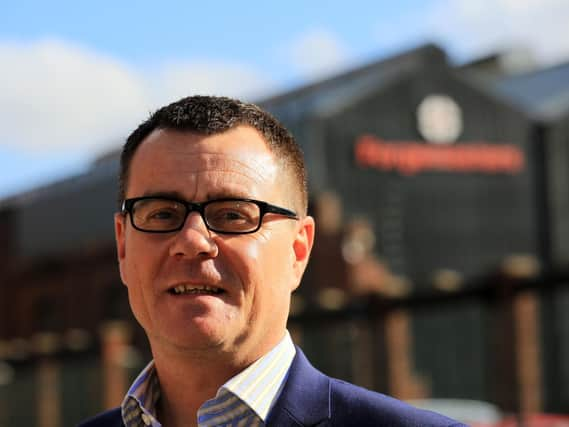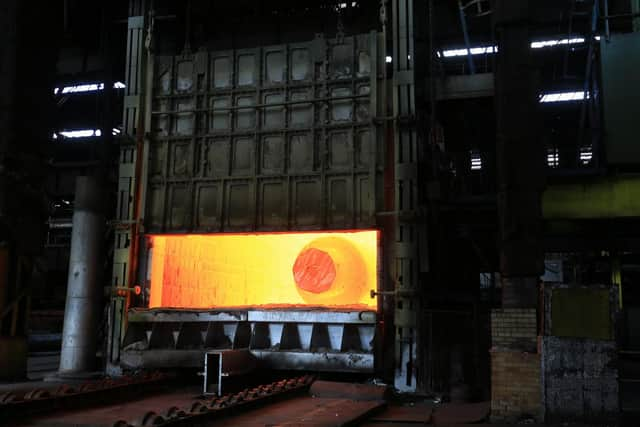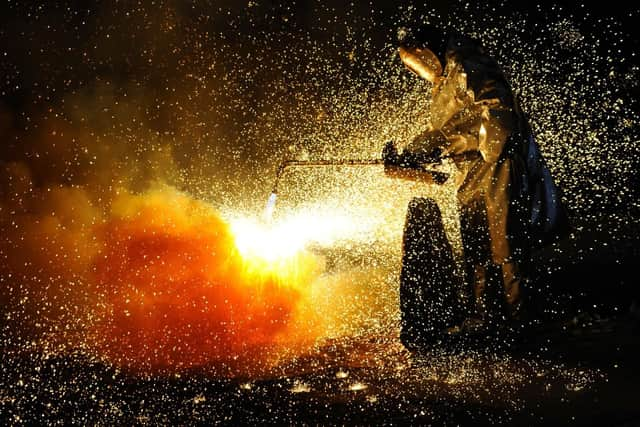Sheffield Forgemasters director Brendan Kendrick:Â '˜We're still the largest independent steelmaker in the world. It's an incredible thing'


But one major name has endured.Â
Sheffield Forgemasters International, operating from hulking, black-painted buildings in Attercliffe either side of the road out of the city centre towards Meadowhall, was founded in 1805 but has repositioned itself to become a maker of forgings and castings for some of the most demanding applications on the planet, from the Navy's new Dreadnought submarines to modern nuclear reactors.


And this summer it was all change again, when a new management team took over after Dr Graham Honeyman stepped down as chief executive. David Bond was appointed as his successor, and he was joined by new chief financial officer Steve Hammell, new chief operational officer Paul Cahill and former Rolls-Royce senior manager Colin Smith as chairman.
Advertisement
Hide AdAdvertisement
Hide AdBrendan Kendrick, meanwhile, has arrived as sales director and is responsible for finding customers and maintaining a healthy order book.
Luckily there is plenty of work on the horizon - the firm has a strong slate of contracts worth £140 million, and bosses are upbeat about the future despite the company posting a £16.4 million loss for the year to December 31, 2017; this was a 'technicality', Bond has said, owing to changes in accounting.
Were it not for the accounting switch, the company would have recorded a modest pre-tax profit of £200,000 on revenues of £76.1m, an increase of four per cent over 2016.Â


"With a new senior management team comes a new impetus," says Brendan in a boardroom at Forgemasters' sprawling factory site, a place of deafening noise and intense heat from the furnaces. "Of course, we need to look at how we take the business forward and where we're going, and there's a lot of work that comes with that. We're not just going to carry on with the same drumbeat we had previously."
Advertisement
Hide AdAdvertisement
Hide AdBorn in Wakefield and the son of an electrical engineer - his father worked for BT - Brendan studied mechanical and manufacturing engineering at Sheffield Hallam University before taking commercial roles at two leading corporates, Saint Gobain and ITW.
He is 'extremely proud' to have been hired by Forgemasters, he says.
"I've come back to my roots and I'm thoroughly enjoying it. It's an iconic British business, it's right at the pinnacle of UK engineering and that's where it needs to stay. It's exceptionally exciting, and then there's the challenge that comes with that - to make sure this business carries on for the next 150-200 years."
He praises Dr Honeyman for 'rescuing' the company with a management buyout in 2005, two years after it was put into administration. Subsequently there has been an increased focus on specialist services - one of the main areas is defence, with orders in from the UK and America.
Advertisement
Hide AdAdvertisement
Hide Ad"Those two are the backbone of the business at the moment. But that means we've got to invest as well."
A record intake of 33 apprentices has come on board this year - these are effectively 'apprentice for life' positions, given the specific skills involved.Â
"It's local kids from local schools. That's important as well. There's people working here whose grandads and great-grandads have worked here, there's fathers and sons working here at the moment - long may that continue."
Research and innovation is key too - "We've got to be going out to our customers with new techniques, methods they've never seen before" - which means Government grants are needed.Â
Advertisement
Hide AdAdvertisement
Hide AdBrendan hesitates to say whether Forgemasters gets enough public subsidy.
"Of course we always look for more, as we should be. We work closely with UK Steel and they do lobby the government for investment, stating our position. The steel industry in the UK has been through a tough time, but it should be one of the backbones of UK manufacturing, whether it's steel for construction or specialist manufacturers like ourselves."
He continues: "We're still the largest independent steelmaker in the world. It's an incredible thing for Sheffield to have. That needs to be nurtured and looked after, and we're the custodians of that now."
When UK defence projects finish in 2020/21, Forgemasters will require 'a different pipeline of work', including steel processing and civil nuclear schemes such as small modular reactors - electricity generators that can largely be built in factories to cut construction costs.
Advertisement
Hide AdAdvertisement
Hide AdAll the while there is the pressure of fending off cheaper overseas competition.
"We have competitors everywhere that can manufacture similar types of components. Can they do it with the same integrity, the same specification in these really highly-demanding applications? Probably not."Â
The firm invested £10 million into new plant in 2017, including a £2m upgrade to its electric arc furnace and a £6.5m investment into huge state-of-the-art BOST tools. Spending on improvements is to be doubled in 2019 to £20m; lending facilities with US bank Wells Fargo have been extended until 2020.
Dr Honeyman has stayed on as a consultant, with the title '˜international business development manager', and will help to find new countries to do deals with.
Advertisement
Hide AdAdvertisement
Hide Ad"We've got to choose right," says Brendan. "For example, in the Indian market, they partner with Russian nuclear reactor builders, so at the moment that's not a place where we operate."
And Forgemasters has 'obviously got an eye on Brexit'.
"We've got a lot of work in place in terms of what happens, but we've done trade in Europe for many years, we've done trade outside of Europe into North America, into China, Russia. We're prepared and ready. What exactly that will look like just yet we don't know. We're prepared for eventualities."
Brendan, 47, has three sons and a stepson, and still lives in Wakefield. "I've got to look at a 15, 18-year tenure," he says. "I want to make sure I leave behind a great legacy. That's my responsibility and my job."Â
Nuclear submarine programme relies on factory
Security has been stepped up at Sheffield Forgemasters to keep out spies as it creates parts for the new Dreadnought submarines.
Advertisement
Hide AdAdvertisement
Hide AdThe vessels - the replacement carriers for the UK's Trident nuclear deterrent - are the country's biggest military project since the Second World War.
"This site is integral to the delivery of the UK defence programme," says Brendan Kendrick. "There's been more security, it's important to the industry partners we're involved with."
All of Forgemasters' 670 employees have had to undergo background checks, and sturdy gates and barriers have been installed. Photography is tightly controlled and certain products are covered up before being sent out on trucks to make sure no-one can steal any secrets - this applies even when moving sensitive items between the company's buildings.
"Also there is the cyber threat as well, which we've got to be very aware of. We've got to put things in place to make sure any data that's received is held securely."